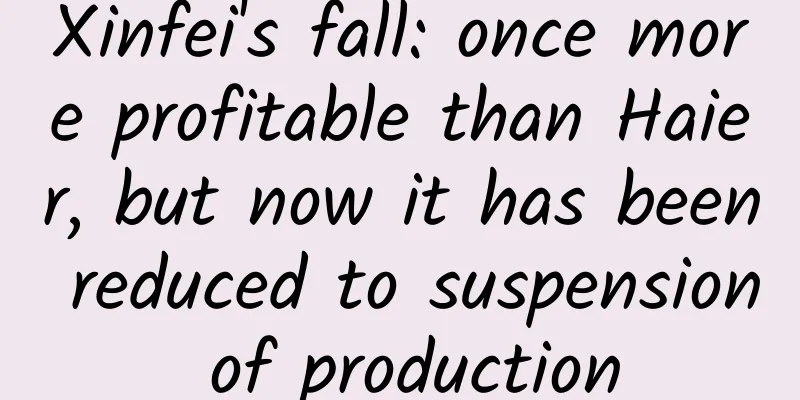Xinfei's fall: once more profitable than Haier, but now it has been reduced to suspension of production

|
On Hongli Avenue (center) in Xinxiang City, Henan Province, a shop called "Xinfei Recruitment Office" has been locked with a bright red lock. Opposite the recruitment office is the office of Henan Xinfei Electric Co., Ltd. (hereinafter referred to as "Xinfei Electric"). A white marble statue faces the main entrance, a big ball is placed on top of an old-fashioned two-door refrigerator, and a stainless steel eagle is poised to swoop down with its wings spread. The "Xinfei Refrigerator" sculpture at the main entrance of Xinfei Company Due to continuous huge losses of 507 million Singapore dollars (about 2.483 billion yuan) for more than six consecutive years and total liabilities exceeding 2.2 billion yuan, the once nationally renowned refrigerator giant Xinfei Electric finally made the decision to suspend production and reorganize on November 1, 2017. As for the decline of Xinfei, some people point the finger at the foreign shareholder introduced 23 years ago, Singapore's Hong Leong Group, saying that it did not operate well after taking control of the operation. Some analysts also believe that the local government's problems in managing the Xinfei brand have affected the reputation of the Xinfei brand. However, behind the simple emotions of Xinfei employees, the impact of Xinfei's "head" Liu Bingyin's missed opportunities for "listing" and "diversification" on Xinfei's fate cannot be ignored. After several twists and turns, the reporter also contacted a number of middle and senior management who had worked in Xinfei, trying to restore this once glorious refrigerator company, how it went from being a small local military-industrial enterprise that relied on loans to pay wages to becoming the leader in the domestic refrigerator industry; and why, after introducing foreign shareholders at its peak, it missed development opportunities one after another and gradually declined. The Golden Age of "Liu Bingyin": Once Ranked Among the Top Ten Most Valuable Brands in China "The factory's cumulative losses have reached more than 700,000 yuan, and the company has relied on loans to pay employees' wages for three consecutive months." This was the situation of Xinxiang Radio Equipment Factory in 1981. At that time, the company was a small local military enterprise under the jurisdiction of the former Fourth Ministry of Machine Building. Xinxiang Radio Equipment Factory was the earliest predecessor of Xinfei. That year, Liu Bingyin was the last deputy director of Xinxiang Radio Equipment Factory. Li Lianyin, former head of the Xinfei Party Committee Work Department, exchanges ideas with Liu Bingyin (right). Image from "Advertising in the End" When other leaders fled this "severely affected household", Liu Bingyin took on the heavy responsibility of factory director. In order to turn the company around, Liu Bingyin mobilized workers to start a "short, flat and fast" project, earning 1.8 million yuan by assembling "black and white TVs" and "recording machines". In 1983, Xinxiang Radio Factory not only paid off all its debts, but also got rid of the label of loss. After seeing the hot sales of refrigerators, Liu Bingyin decided to switch to refrigerator production and introduced equipment and technology from Philips IRE of Italy. On December 8, 1984, the first phase of the Xinxiang Refrigerator Factory broke ground, and Xinfei was officially born. The first phase invested more than 18 million yuan, with 6 imported production lines and 9 domestic production lines. The 100,000 refrigerator production line was officially put into production on November 10, 1986. After being launched on the market, the "Xinxiang-Snow Flower" brand refrigerator won Xinfei many awards from all over the country, including the "Golden Rabbit Special Award" at the First Shanghai Famous and Special Products Expo, and many honors came one after another. "Later it was also called Xinxiang-Philip, but a legal dispute arose, so it was later changed to 'Xinfei'. The word Fei is actually the homonym of the word Fei in 'Philip'." An "old minister" who once assisted Liu Bingyin at Xinfei told the Pengpai News reporter. In 1988, Xinxiang Refrigerator Factory completed its annual production plan three months ahead of schedule, and its sales revenue, realized profits and taxes, and per capita profits and taxes all ranked first in Xinxiang City, making Xinfei a star enterprise in Xinxiang City. In 1989, Xinfei Refrigerator Factory achieved sales revenue of 214 million yuan and profits of 28.79 million yuan. "Although he didn't even finish the fourth grade of elementary school, he dared to think and act, had his own ideas, and was very strict in management." The above-mentioned person familiar with the matter told the reporter from The Paper that Liu Bingyin had strict requirements on product quality. He once publicly stated that "whoever damages the Xinfei brand will lose his job." On May 20, 1990, Liu Bingyin smashed more than 400 substandard refrigerators with a sledgehammer in front of hundreds of Xinfei refrigerator sales representatives, news media and Xinfei employees. In September of the same year, Liu Bingyin once again destroyed more than 1,000 substandard refrigerators, "dismissed the deputy director in charge of quality, stopped production for a month, reduced the wages of all factory managers by 30%, and launched a quality rectification campaign for all employees." In addition to strictly managing product quality, Liu Bingyin, who did not play by the rules, also boldly broke the rigid thinking of many employees in state-owned enterprises in that era. At that time, some people always believed that "once you enter Xinfei, you are a state-owned enterprise employee; whether you work or not, you will have three meals a day." "'If you don't work hard today, you will have to work hard to find a job tomorrow' was painted on the wall at the time. Liu Bingyin really dealt with people." The above-mentioned person told the reporter of The Paper that Liu Bingyin was the first to break the rigid system of "iron salary, iron chair, and iron rice bowl" under the planned economic system, and implemented competition for positions, so that cadres could be promoted or demoted. "A deputy factory director was directly exempted from pushing a cart in the factory because he did not do a good job. On December 18, 1991, with the approval of the Henan Provincial People's Government, Henan Xinfei Electric Group was established based on the Xinxiang Refrigerator Factory and in conjunction with dozens of refrigerator parts manufacturers, colleges and universities, and scientific research institutions in and outside the province. On January 18, 1994, Henan Xinfei Electric Appliance Group was restructured into Henan Xinfei Electric Appliance (Group) Co., Ltd., with employees holding 17.04% of the shares and state-owned assets holding 82.96%. "From 1991 to 1994, Xinfei grew rapidly at an average annual rate of 40%." The above-mentioned person familiar with the matter told the reporter of The Paper that under the leadership of Liu Bingyin, Xinfei once entered the top ten most valuable brands in China. On May 20, 1990, Xinfei Company destroyed 400 substandard refrigerators. Image from "Advertising" Singapore Hong Leong Group took over: Xinfei refrigerator sales once exceeded 1.2 million units, and total profit exceeded 300 million Just when Xinfei was enjoying great success, the Hong Leong Group from Singapore appeared. On August 2, 1994, Henan Xinfei Electric (Group) Co., Ltd., Singapore Hong Leong Electric Pte. Ltd. and Singapore Yuxin Electric Co., Ltd. jointly established Henan Xinfei Electric Co., Ltd., with the three parties holding 49%, 45% and 6% of the shares respectively. On October 13 of the same year, Henan Xinfei Electric Co., Ltd. was officially established. Xinfei Electric's registered capital is 668.6377 million yuan, of which Xinfei Group contributed 327.6324 million yuan and the two Singapore parties contributed 341.0053 million yuan. In the early spring of 1994, in order to effectively promote and implement the reform and opening-up strategy formulated by Henan Province, the then main leaders of Henan Province led a delegation to visit Singapore, one of the four Asian tigers. During the meeting with Singapore's former Senior Minister Lee Kuan Yew, the main leaders of Henan Province earnestly hoped that people of insight from Singapore's business community would invest and develop in Henan. As to why the Hong Leong Group was chosen to participate in the shares at that time, Li Lianyin, who was once the Minister of the Party Committee Work Department of Xinfei, wrote in the book "Advertising to the End" that Mr. Guo Fangfeng, the chairman of the board of directors of the Hong Leong Group at that time, was inspired by the meeting and immediately sent personnel to Henan for inspection, and finally chose Xinfei Electric as a partner. "When we established the joint venture in 1994, Xinfei's sales volume could not catch up with Haier, but its profit was higher than Haier. Before the joint venture, Haier's net profit never exceeded Xinfei's in any year." The above-mentioned person familiar with the matter told The Paper that when Xinfei was at its peak, Liu Bingyin did not want to form a joint venture with foreign capital. On June 8, 1994, the feasibility study report demonstration meeting of the Xinfei-Honglong joint venture project was held in Zhengzhou, Henan. The meeting unanimously agreed that the new Fei after the joint venture could use the capital, technology and management advantages of the joint venture to enhance its international market competitiveness. "Liu Bingyin was very strong and he disagreed, so this equity structure was formed." He said that at that time, the Singaporean side also tried to control the shares, but Liu Bingyin disagreed. Under the dilemma, he established Yuxin Electric in Singapore through the Henan Provincial Government's Singapore Representative Office. "In this way, Yuxin Electric plus Xinfei Group's shares will be 55%, which convinced Liu Bingyin to agree." In fact, the combined shareholding ratio of Yuxin Electric and Fenglong Electric is 51%, which can also achieve a controlling position in Xinfei Electric. Contrary to the biased view of the outside world, the joint venture with Hong Leong Group facilitated the leapfrog development of Xinfei at that time. "After the joint venture, we invested 420 million to build China's largest fluorine-free refrigerator factory with an annual production capacity of 600,000 units. It was internally called Factory 39 and was completed and put into production on January 5, 1996." A middle and senior executive told the reporter of The Paper that the launch of fluorine-free refrigerators was in line with the trend of international and domestic calls for the protection of the ozone layer, and the product was widely recognized by the market after its launch. In 1996, Xinfei refrigerator sales exceeded 1.2 million units, and total profits exceeded 300 million yuan for the first time. "Xinfei was at its peak at that time." The above-mentioned middle and senior management told the reporter from The Paper that because Xinfei failed to shift from "product management" to "brand management" in a timely manner and had been slow to "diversify", it had already begun to lay hidden dangers at its peak. Li Lianyin talks with Gao Jialin (right), former vice chairman of Xinfei. Image from "Advertising in the End" “Diversification” missed: refused to go public, tried twice to enter the air-conditioning industry "The sales volume of Xinfei refrigerators increased from 1.2 million units in 1996 to 1.6 million units in 2000, but sales revenue has remained stagnant, and the profit margin has gradually fallen from 16% in 1996 to below 6% in 2000." The data disclosed by Li Lianyin in the book shows the increasing risk of decline of Xinfei Electric. "Compared with Midea, which has pursued diversification, Midea's brand value was 2.9 billion yuan in 1997, while Xinfei's brand value was as high as 3.2 billion yuan. In 2001, sales of Midea's product series were close to 15 billion yuan, while Xinfei's sales hovered between 2.5 billion and 3 billion yuan." Compared with Kelon, Rongsheng and Qingdao Haier, members of the "Four Major Families" in the refrigerator industry, the gap is even greater. "What's the use of 'big and complete'? Didn't Haier come up with many new things? Practice has proved that there is nothing worth bragging about. The profit and tax it realized is less than one-third of mine." The book "Advertising to the End" reveals Liu Bingyin's views on "diversification". Liu Bingyin also disagrees with the listing of enterprises. "Listing, listing! Beijing, Shanghai, Shenzhen... groups of intermediaries came to "tinker" with Xinfei's listing, without asking for a penny, helping for free, but I was not tempted. I told them that listing is just about making money, and I have no place to spend my money, and the bank is still loaning me money," he wrote in the book "Advertising to the End". In 1993, Midea Electric Appliances and Qingdao Haier entered the capital market one after another. Taking advantage of the convenient financing conditions of the capital market, the two companies went further and further on the road of diversification, leaving Xinfei far behind. After realizing the gap, Liu Bingyin twice pushed Xinfei to diversify and enter the air-conditioning industry, but both times he failed. The first time was in the second half of 1997. At that time, the Blue Wave air conditioner invested by Whirlpool in Shenzhen had suffered losses for three consecutive years, and Whirlpool decided to "liquidate" Blue Wave air conditioner at a price of 200 million yuan. However, the idea of taking over and achieving "diversification" of Xinfei was opposed by the Singaporean side of the board of directors. "It was beyond the expectations of the Chinese executives of Xinfei Electric," Li Lianyin said in the book. Xu Xiaodong, as the representative of Yuxin Electric, believed that blindly intervening in the air-conditioning industry was too risky, and Gao Jialin, a director of Hong Leong Group, also agreed with this. The acquisition decision was eventually rejected by the board of directors. Xinfei Electric's second attempt to enter the air-conditioning industry was in early 2000. At that time, Xinfei Electric tried to acquire Guangdong Zhongshan Sanrong Air Conditioning Appliance Co., Ltd. "We even basically agreed on the handover time with Sanrong Company." The above-mentioned insider told the reporter of The Paper that the acquisition was again rejected by Fenglong Electric and Yuxin Electric, and the reason was also that they did not want Xinfei Electric to expand blindly and engage in a "war of attrition." "Especially in the later years of Comrade Liu Bingyin, middle-level and even senior managers of Xinfei lacked decision-making autonomy and could not adapt to the rapid changes in the market, which made Xinfei's market response very slow. In addition, the marketing methods and marketing platforms were relatively lagging behind. The overall performance of Xinfei Electric began to decline, and it was once in a passive situation in responding to market changes." The book "Advertising to the End" wrote that watching the rapid decline in sales performance made Liu Bingyin very annoyed and his temper became worse and worse. He even kept replacing the vice president of sales and regional managers, hoping to stimulate the potential of his subordinates and stimulate the revival of sales performance through the "lever" of personnel appointments and dismissals. Unfortunately, on September 15, 2001, Liu Bingyin died of stomach cancer at Guangzhou Nanfang Hospital at the age of 61. Thus, the Liu Bingyin era at Xinfei came to an end. Until the end of his life, Liu Bingyin was unable to lead Xinfei towards "diversification". Xinfei Electric Co., Ltd. is discontinued Cultural clashes during the Hong Leong era: Employees went from proactively putting out fires to “letting it burn” In fact, half a year before Liu Bingyin's death, the equity structure of Xinfei Electric changed. In February 2001, Hong Leong Holdings acquired 6% of Yuxin Electric's shares, which increased Hong Leong Electric's shareholding ratio to 51%, and the Singaporean party obtained controlling rights. Although the controlling stake has changed, according to the joint venture articles of association, the Chinese side still has the right to operate and manage the joint venture. After Liu Bingyin passed away, Li Gen took over the baton and became the chairman and party secretary of Xinfei Group and Xinfei Electric. After taking over, Li Gen immediately reduced the management department and changed the original vertical management model to a flat management model, changing the previous "power monopoly" to delegating power to the team and promoting an incentive mechanism. "In 2002, Xinfei broke the six-year-old unchanged industry ranking pattern and jumped from third to second for the first time. In 2003/2004, Xinfei continued to rank second in the industry." Li Lianyin wrote in the book that in 2004, Xinfei once again achieved a historic breakthrough, with refrigerator sales exceeding 2 million units to 2.1 million units, a year-on-year increase of 21%, setting a historical record. Li Gen's era did not last long. In September 2005, the Xinxiang local government sold 39% of its shares to Fenglong Shares for 510 million yuan, and Fenglong Electric's shareholding in Xinfei Electric jumped to 90%. At this point, Fenglong finally obtained the management rights of Xinfei Electric. In November 2006, Malaysian Zhang Donggui replaced Li Gen as the manager of Xinfei Electric and carried out drastic reforms to Xinfei Electric. The conflict between the Chinese and foreign management styles and corporate cultures also began from then on. "A large number of managers from Singapore were parachuted into Xinfei." A former middle or senior executive of Xinfei Electric told the reporter from The Paper that when the equity was transferred in 2005, the number of middle-level managers at Xinfei Electric did not exceed 100, but by 2010, this number had soared to 400. The rapid expansion of management personnel also made the decision-making process more complicated and inefficient. The decision-making process of Li Gen's era, "President (or General Manager) - Vice President (or Deputy General Manager) - Management Department Execution", eventually became "President - Chief Operating Officer - Senior Vice President - Vice President - Management Departments at All Levels". "Just for business trip reimbursement, it takes at least three to five days to sign off." "Because the company is not mine, I was hired with a high salary to manage the company." Zhang Donggui once said bluntly. "Regular workers and migrant workers are all masters of Xinfei." This is a slogan widely circulated among Xinfei employees. However, Zhang Donggui is quite disgusted with this. In his opinion, the company belongs to the boss, the boss is the master, and the employees are just employees. "Every year on the sixth or eighth day of the first lunar month, on the first day of work, Liu Bingyin would line up at the door with middle and senior managers to welcome employees to work." The middle and senior manager said, "After the Singaporean managers came in, these things were gradually cancelled. They probably think that you are employees and it is your duty to come to work. Why should I welcome you?" "During the Chinese New Year and other festivals, the company will insist on giving out gifts such as rice, flour and oil." He told the reporter from The Paper that some employees had suggested giving out money directly, but Liu Bingyin refused. "Other companies will think Xinfei is good when they see it, and their families will be happy when they take it home, and Xinfei employees will also feel proud." Unless he is on a business trip, Liu Bingyin will appear in the company's open space at 8 o'clock every day wearing "Xinfei Blue" work clothes and do radio gymnastics with the company's employees. "Every month, the company will celebrate the birthdays of all employees, and the company cafeteria will improve the food, so that everyone can have fun together." Under Zhang Donggui's cultural reconstruction, the culture left over from Liu Bingyin's era was gradually abandoned. “It’s a pity that they still use foreign management methods and don’t know how to adapt.” A person close to the senior management of Hong Leong said that the Hong Leong team failed to continue the original corporate culture. "On March 15, 2003, a fire broke out in the most advanced fluorine-free refrigerator production line. Employees rushed into the factory to put out the fire without waiting for the fire truck to arrive. The factory was completely blackened. Ten days later, the factory was brand new, all because of the employees' cleaning bit by bit." As for the change in the feelings of Xinfei employees towards Xinfei, the above-mentioned insider cited two vivid examples. He said that in 2007, a fire broke out in the air-conditioning factory of Xinfei Electric. "At that time, the employees stood on the roadside, looked at the fire and said, let it burn, it would be better if it burned out. I was at the scene. In just four years, the company went from love to hate. How could it not collapse?" Xinfei Office Area Huge losses await new life: the government hopes to revive the Xinfei brand "It should not have been loss-making before 2010." The above-mentioned person told the reporter of The Paper that in December 2007, Henan became a pilot province for the national fiscal subsidy for home appliances going to the countryside. Thanks to this policy, Xinfei's performance has not yet incurred losses. "At that time, there were companies that offered 5 billion to buy Xinfei, but Zhang Donggui did not sell it. He believed that Xinfei could still develop and sell at a better price." Thanks to the subsidies for home appliances going to the countryside, the entire refrigerator industry showed a rapid growth trend, while the growth rate of Xinfei refrigerators was only in single digits. As he failed to lead Xinfei Electric to fulfill the "requirements of the board of directors", Zhang Donggui left the company in November 2010. Data shows that Xinfei Electric's losses began in 2011. From 2011 to 2016, Xinfei Electric's losses were 51.66 million Singapore dollars, 117 million Singapore dollars, 37.63 million Singapore dollars, 60.64 million Singapore dollars, 110 million Singapore dollars, and 130 million Singapore dollars, respectively. The total loss in 6 years was 507 million Singapore dollars, which is equivalent to 2.483 billion yuan at the current exchange rate. "After Zhang Donggui, Hong Leong began to frequently change leaders, and each person came to formulate different strategies." The above-mentioned person close to Hong Leong's senior management told the reporter of The Paper, "Some cut advertising, some reduced product prices, and some cut outlets, all in order to make the financial statements look good in a short period of time." Public data shows that in November 2010, after Zhang Donggui left, in December, Gao Jialin, the former vice chairman of Xinfei Electric, was reappointed as the chairman of Xinfei Electric two years after retirement. In August 2011, the chairman was replaced by Ruan Jianping, and the president was changed to Wu Juncai. In the same year, Yang Jian, the former general manager of sales, Liang Shangyong, the former general manager of technology, and Yin Haoen, the chief financial officer, who were appointed by Hong Leong, left Xinfei Electric one after another. "Previously, Xinfei had 18,000 sales outlets across the country, but later it was cut to 10,000 outlets. This was the easiest way to reduce costs. Although losses were reduced, there were no channels to sell new products, so sales later fell sharply." He told the Pengpai News reporter that the decision-makers at Hong Leong were also opposed to e-commerce, and it was not until 2013 that the e-commerce division was finally launched. Frequent personnel changes and constantly changing strategies not only failed to help Xinfei turn losses into profits, but further harmed Xinfei Electric. The continued huge losses eventually made Hong Leong unable to continue supporting it. "Fong Leong increased its capital by 400 million yuan after the employees stopped working, and later invested another 750 million yuan, totaling 1.15 billion yuan." The above-mentioned person familiar with the matter told the reporter of The Paper that currently, Xinfei Electric's fixed assets are 600 million yuan and its current assets are 900 million yuan. The larger debts include 400 million yuan in bank debts, 700 million yuan in supplier debts, and 1.15 billion yuan in shareholder loans, totaling about 2.25 billion yuan. According to information obtained by The Paper, the Xinxiang Municipal Government has sent multiple teams to contact large domestic home appliance companies. In addition, some companies have also taken the initiative to contact Xinfei. "All parties are looking for investors in full swing. If suitable investors can be found and funds come in quickly, Xinfei's brand value can be preserved. If it is delayed too long, it will also hurt Xinfei." The above-mentioned insider said, "The government also hopes to revive the Xinfei brand and is very confident." The reporter also exclusively learned that Xinfei Electric's first creditors' meeting will also be held on January 19. As a winner of Toutiao's Qingyun Plan and Baijiahao's Bai+ Plan, the 2019 Baidu Digital Author of the Year, the Baijiahao's Most Popular Author in the Technology Field, the 2019 Sogou Technology and Culture Author, and the 2021 Baijiahao Quarterly Influential Creator, he has won many awards, including the 2013 Sohu Best Industry Media Person, the 2015 China New Media Entrepreneurship Competition Beijing Third Place, the 2015 Guangmang Experience Award, the 2015 China New Media Entrepreneurship Competition Finals Third Place, and the 2018 Baidu Dynamic Annual Powerful Celebrity. |
Recommend
A thousand-yuan phone also has a fingerprint "big trick" Dashen Note3 hands-on experience
Redmi, Meizu Blue, Honor Play, Lenovo Lemon... Do...
Robots can spin pens and roll walnuts! GPT-4 helps robots perform better with more complex tasks
Dear friends, after artificial intelligence (AI) ...
Who knows, family members? ChatGPT actually knows "flattery"!
Have you ever thought that the answers generated ...
Process and specification are just a guarantee tool, not a methodology.
Start with a purpose and clarify the meaning Ther...
What has changed in WeChat in the past eleven years?
On January 6, 2022, the WeChat team’s annual WeCh...
Even though Yidao has found a buyer, it still has little momentum to grow.
The mysterious buyer of Yidao has finally surfaced...
Startup products: How to scale up offline?
Recently, I have been learning how startups can s...
The soldier wiped his butt with its leaves and committed suicide due to the pain
Makes people and animals go crazy with pain The l...
Hunter Camp high traffic website makes money in 2021, automatic fast and long-term money making [video course]
Hunter Camp high traffic website makes money in 2...
13 ways to make money as a side job. What money-making projects are there on the Internet now?
1. Become a partner of Baidu Zhidao Open Baidu an...
Ideas + steps + methods, three steps to teach you how to quickly build user portraits?
If you are walking on the street and see a person...
Teach you how to write a perfect product promotion plan in 6 steps! (2)
We will teach you how to write a perfect product ...
How to do search engine marketing (SEM) well?
This time I will share a bigger topic, how to do ...
Why did Hawking warn “don’t reply to alien signals”?
Last October, the newly launched FAST received a ...









